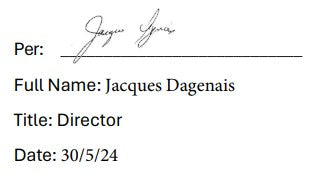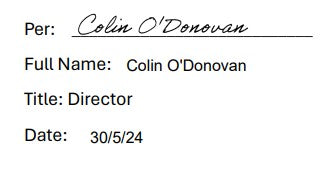2023 Modern Slavery Report
AerRianta International (North America) Inc. (“ARINA)" takes a firm stance against all forms of forced labour, child labour and human trafficking. This report is issued pursuant to Section 11 of Canada’s Fighting Against Forced Labour and Child Labour in Supply Chains Act (the “Act”) for the financial year ending 31st December 2023 (the “Reporting Period”).
This is a joint report of ARINA and its parent company, Aer Rianta International cpt (“ARI”) , which is subject to the reporting requirements under the Act by virtue of its direct ownership of ARINA assets that meets the statutory threshold of the Act. ARINA and ARI cpt are collectively referred to as the “ARINA Group”. This report overviews the ARINA Group policies, procedures and actions taken during the Reporting Period, which all continue to evolve and incorporate global best practices.
Steps Taken During the Reporting Period
In general terms, ARINA took the following steps during the Reporting Period to prevent and reduce the risk of forced labour or child labour in its business and supply chains:
- - established an internal working group comprised of management representatives from supply chain, legal and senior management to review the impact of the Act on ARINA;
- - began the process of mapping its supply chains; and
- - conducted an initial internal assessment of the risks of forced labour and/or child labour on its activities and supply chain.
Details of the above actions are set out in this report.
Structure
ARINA is a wholly owned subsidiary of ARI and is incorporated in Canada under the Business Corporations Act (Quebec). ARINA has operations in 5 Canadian international airports located in Vancouver, Edmonton, Winnipeg, Quebec City and Montreal, with the majority of its operations in Montreal. Employing 228 people, ARINA sells travel retail products to end consumers in both domestic and international areas of the various airports where it conducts business. ARINA’s corporate headquarters are located in Dorval, Quebec.
ARI is an Irish semi-state company that first began operations in 1988. The ARI Group has direct and indirect interests in international airport retailing and duty-free activities and/or management contracts in fourteen countries across Europe, North America, the Middle East and Asia. The Group also has investments in companies engaged in international airport management.
Activities
ARINA provides duty free, retail shopping experiences in airports across Canada. The company sells over 12,000 items across divisions including liquor, confectionary, souvenirs, fashion, perfume and cosmetics. ARINA activities also include but are not limited to marketing, product procurement, leasehold improvements, ecommerce, customs clearance, logistics, and IT deployment.
Supply Chain
Suppliers are defined as any entity with whom ARINA enters, or has entered, into a commitment to provide products and/or services to ARINA and/or its customers. ARINA procures products and services both for trade and for non- trade purposes. These include but are not limited to: wholesale purchased goods for retail sale, human resources, advertising and marketing, information technology, business operations, and real estate, catering, travel services, cleaning, telecommunications, legal services, accounting services, auditing services and hospitality.
During the Reporting Period, ARINA engaged 540 suppliers and purchased goods and services in excess of CAD$30 million. ARINA engages suppliers locally, nationally and internationally. ARINA imported CAD$21 million worth of goods for resale purposes. During the Reporting Period, we sourced approximately 53% of the goods we purchased from suppliers in Canada, 30% from the U.S. and 17% from international sources. We appreciate that many of our suppliers supply us with products that originate from other jurisdictions, and all have their own global supply chains. We have not yet begun mapping our tier 2 suppliers.
Policies and Diligence
Policies
ARINA Corporate Policies and Risk Management protocols provide frameworks and objectives to identify, assess, manage, monitor and report significant risks. The Board of Directors and/or senior management provide oversight over material risks and risk management frameworks. ARINA requires risks to be reviewed quarterly and to be updated as necessary. Internal stakeholders provide input during the policy development and update process, as well as when developing supporting documents such as guidelines and directives.
ARINA diversity, equity and inclusion guidelines reflect our commitment to ensure that all policies, procedures, programs and practices comply with regulatory and legal requirements in the jurisdictions where we operate, and formalize our commitment to non-discrimination and equality of opportunity. ARINA Environmental and Social Governance (ESG) came into effect in 2022 and continues to evolve as part of the foundation of our policy-making and policy integration. These foundations include (regarding forced labour and child labour mitigation): Diversity, Equity, & Inclusion, and Labour Standards.
Our ESG values of People, Planet, Products require us to consider the impact of our business decisions on our stakeholders and the communities where we do business. The policy encourages us to speak up and do what’s right, even when we face difficult choices.
ARI Group has also pledged to the UN Global Compact - a call to companies to align their strategies and operations with ten universal principles related to human rights, labour, environment and anti-corruption, and take actions that advance societal goals and the implementation of the Sustainable Development Goals.
Due diligence processes
Tier 1 suppliers are vetted both at the local level and through our corporate parent entity. Our supplier vetting outlines the expectation that our suppliers will support our values of integrity, fair dealing and sustainability. Suppliers must abide by applicable employment standards, labour (including forced labour and child labour), non-discrimination and human rights legislation. In jurisdictions where employment standards and laws do not address discrimination or human rights, we expect suppliers to adopt policies and codes of conduct that consider the Act, and to convey these expectations to their own suppliers. Suppliers must not tolerate slavery, servitude, forced or compulsory labour, human trafficking or child labour in their business or supply chain. It is expected that suppliers will not interfere with their workers’ right to join a trade union, or to have recognized employee representation under local law. It is also expected that suppliers will follow the applicable wage and hour laws and regulations in the jurisdictions in which they operate.
Risks – Operations and Supply Chain
Due to the nature of ARINA’s business, our entire direct employee workforce is within the borders of Canada (employees in ARINA payroll). The various security clearances required to work within our retail stores prohibits ARINA from having any employee on our direct payroll under the age of majority. Additionally, the various provincial labour standards govern our labour practices. Many of ARINA’s employees are also protected through collective bargaining with the United Steelworkers Union. For these reasons, we consider the risk that there is forced labour or child labour in our operations to be low.
As described above, due to their location primarily within Canada and the United States, we consider the risks of forced labour and child labour within our tier 1 suppliers to be low. However, we appreciate that many of our suppliers source the goods that they provide us from other countries, some of which have been ranked by the Global Slavery Index as having an increased prevalence of modern slavery. While we have not yet begun mapping our tier 2 suppliers, we consider the risks to be lower by virtue of our primary tier supply chain consisting of companies that are either bound by the Act or by similar legislation in their own countries.
Additional risks of modern slavery may exist further down our supply chain that support the provision of certain product categories, such as the conflict minerals used in technology hardware and electronics; timber and steel used in the production of office furniture; and textiles used in uniforms.
Potential risks of modern slavery, such as debt bondage and deceptive recruiting for sub-contracted labour, may exist in support services provided by third party vendors such as cleaning, property maintenance, security, food services, transport, courier services and accommodation.
Risk Management
Employees
ARINA complies with applicable employment standards and human rights legislation in all provincial jurisdictions where we operate.
ARINA hiring and recruitment procedures comply with applicable legislation to ensure a fair and equitable approach to hiring. We promote diversity, equality and human rights in our workforce. We support the right to freedom of association and collective bargaining.
We stand against discrimination in all parts of the employment life cycle, including discrimination on the grounds of ethnicity, race, disability, gender, identity or sexual orientation and gender expression.
Suppliers
In the event one of our Suppliers recognizes a potential gap or weakness in their own operations or supply chain, or if they identify a risk that may impact ARINA we will work with them to determine the possible impact and develop a workable solution.
Measures to Remediate
During the Reporting Period, ARINA did not discover or have made known to us any occurrences of forced labour or child labour, potential or real, in its operations or supply chains. Consequently, ARINA did not have to take any measures to remediate any forced labour or child labour or to remediate a loss of income for vulnerable families.
Training and Awareness
All ARINA employees must complete training on the following topics:
- - Anti Bribery and Corruption
- - Search Policy
- - Dignity & Mutual Respect
- - Creating an Inclusive Work Place
- - Health & Safety at the Workplace
- - Risks & Prevention at the Warehouse
The rate of completion of such training and completed hours of training are tracked and reported in our Human Resources Department. All employees are required to refresh this training every two years.
Assessment of Effectiveness
The ARINA Group recognizes that we have a responsibility to assess and mitigate the risk of modern slavery in our operations and supply chain over the long term. We have begun to assess those risks and take steps to assess, prevent and reduce them, but have not yet taken any actions to assess the effectiveness of those steps.
Approval and Attestation
This report was approved pursuant to subparagraph 11(4)(b)(i) of the Act by the boards of directors of AerRianta International (North America) Inc. and Aer Rianta International cpt, respectively. In accordance with the requirements of the Act, and in particular section 11 thereof, I attest that I have reviewed the information contained in this joint report for the entity specified below. Based on my knowledge, and having exercised reasonable diligence, I attest that the information in this joint report is true, accurate and complete in all material respects, for the purposes of the Act, for the Reporting Period.
I make the above attestation in my capacity as a director of the board of directors of AerRianta International (North America) Inc. for and on behalf of the board.

I make the above attestation in my capacity as a director of the board of directors of Aer Rianta International cpt for and on behalf of the board.



